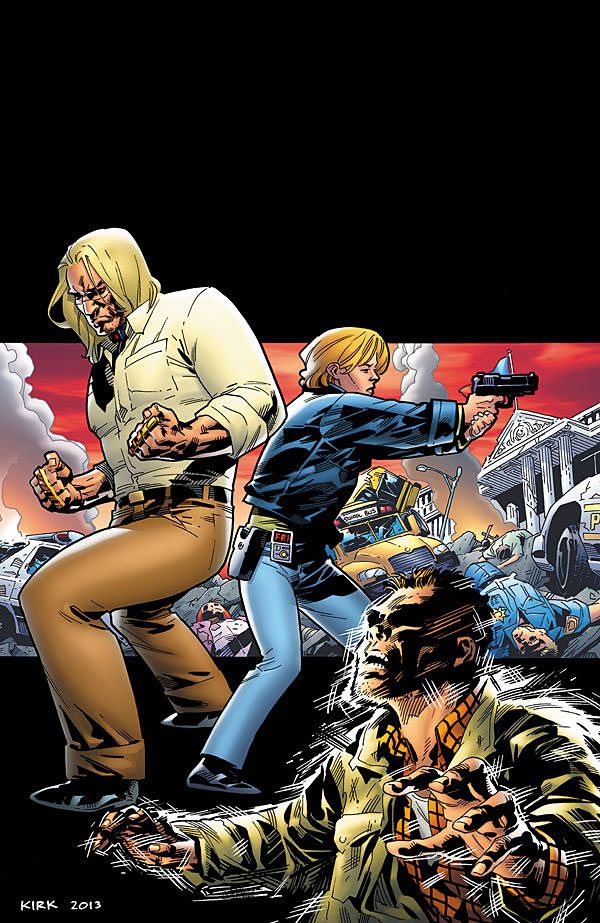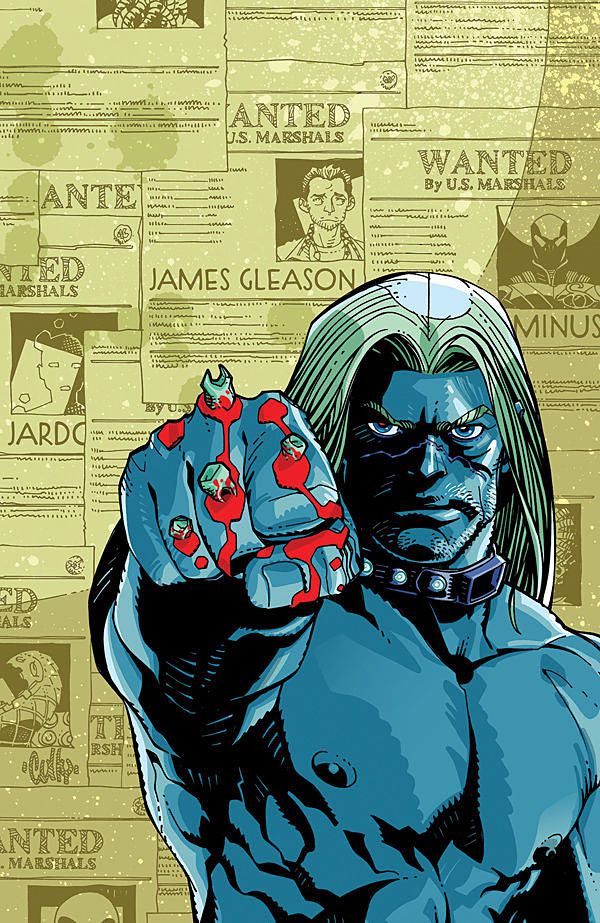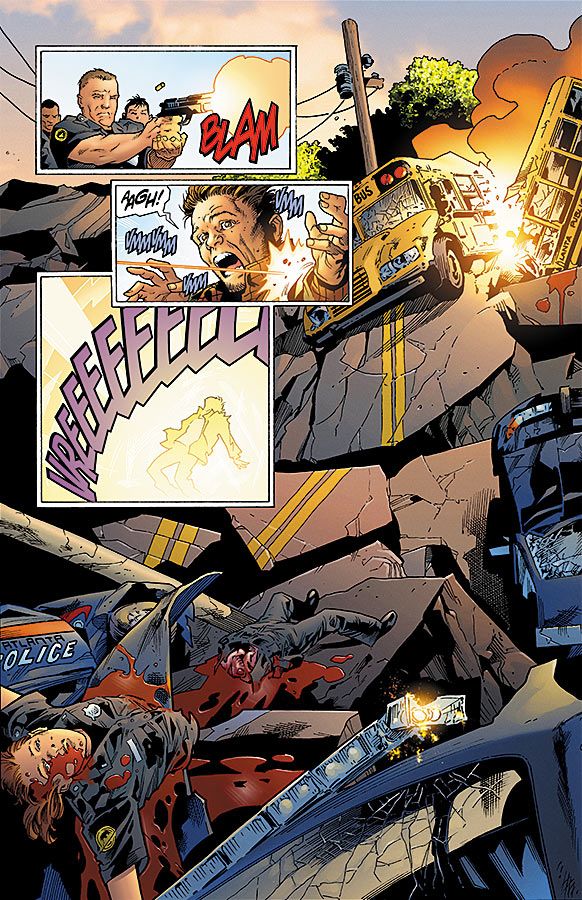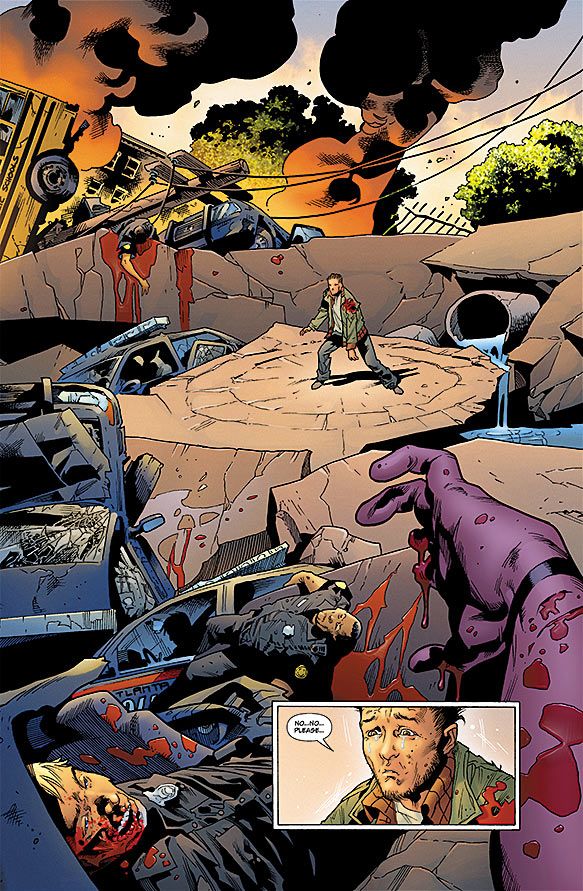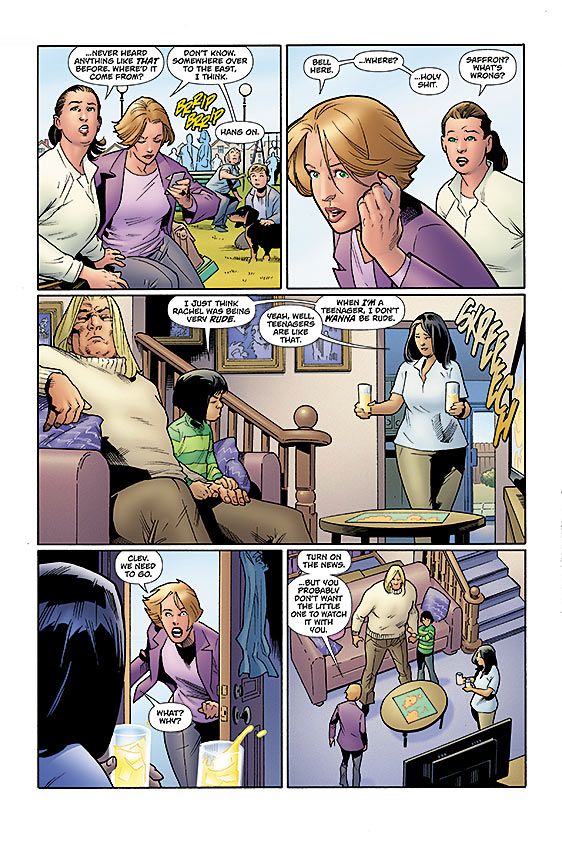Travis "Clev" Clevenger is back on the trail of elusive super-criminals in the return of Dan Jolley's "Bloodhound." Dark Horse Comics published "Bloodhound: Brass Knuckle Psychology" in June, collecting the original DC Comics run of the series, followed by the "Plain Sight" serial in the pages of "Dark Horse Presents" that began in July. This October, Dark Horse will reunite Jolley and the rest of the original creative team -- penciller Leonard Kirk, inker Robin Riggs and colorist Moose Baumann -- together for the five-issue "Bloodhound: Crowbar Medicine" miniseries.
The new adventure debuts October 16 and follows the events of the recent "DHP" outing, though Jolley is confident new readers will be able to jump right in. Finding a new home for Clev at Dark Horse has allowed Jolley to revisit the world of "Bloodhound" with fresh eyes and fresh stories. The writer is able to freely explore the character and his world, while also having the support of the emerging and increasingly well-defined Dark Horse superhero universe. "Crowbar Medicine" sends Clev back on the trail of a superhuman accompanied by his handler, FBI Special Agent Saffron Bell, and things heat up quickly when the criminal they're pursuing makes things personal for Clev.
CBR News recently spoke with Jolley about returning to the cult-favorite character after a long and tedious rights-reclamation process, the joy of breathing new life into the book, telling stories with a point and getting the band back together.
CBR News: Bloodhound is a character you originally developed for DC. I know it's been a long road, but what led to your decision to reclaim rights to the character and bring him to Dark Horse?
Dan Jolley: Oh, I made the decision to reclaim rights to the whole property immediately after hearing that the book had been canceled at DC -- it's just that getting the rights back was a sort of lengthy process. There was some (to my woefully untrained eyes) pretty dense legalese in the reversion clause of my contract, so after I waited something like two years I contacted DC and was told, to my surprise, that I'd have to wait one more year. So I did, finally, get the rights back in 2008 or 2009.
It was such a relief to know that "Bloodhound" was mine again, at first I was sort of paralyzed about what to do with it -- my dissatisfaction with how it was promoted at DC was pretty profound, and I was paranoid about letting something like that happen again. Plus, if I did anything else with it in comics, I reallywanted to try to get the same creative team involved, and I knew that wouldn't be cheap. So I held on to the property, and dipped my toe into the Hollywood waters with it... and finally in 2011 my path led me to Dark Horse's door.
I had worked for Dark Horse way back at the beginning of my career, but hadn't done anything for them in a couple decades. In 2011, my job as one of the lead writers for the video game "Prototype 2" put me in touch with Dark Horse editor Dave Marshall, writing some promotional comics for the game. Over the course of working with Dave, I asked him if he'd like to see any of my original ideas, and "Bloodhound"was one of the things I sent in.
Cut to about six months later, and I get an e-mail from Brendan Wright (who would go on to become the new editor) -- he'd just read "Bloodhound" and loved it, and wanted to know how he could've missed it when it originally came out. (That's a familiar refrain. Almost everyonemissed it.) So all of a sudden Dark Horse is interested in re-printing all the available original comics in a trade paperback, and they like my ideas for new material, and we're off and running.
What sort of stories are you hoping to tell with him now that he's found a new home? Are there things you feel you can do with the character now that you maybe couldn't with DC?
One time during the book's original run, I called up my editor, Ivan Cohen, and at the start of the conversation I asked him how his day was going. He said, "Well, today I'm angry and frustrated -- unlike you, I don't have a convenient medium for exorcising my demons." And there was a lot of truth to Ivan's observation -- "Bloodhound"has always been a way for me to tap into whatever anger or frustration I'm feeling and just let it bleed onto the page. That kind of channeling wasn't as focused for me back in 2004as it is now. Now I'm really starting to use issues in the real world that make me just blindly furiousas "grist for the mill."
A lot of it comes from my reading of the epiphany-causing book "Invisible Ink"by Brian McDonald. I cannot recommend that book strongly enough. In "Invisible Ink," McDonald talks about how your story needs to have a point. Not just a theme, but an actual statement it makes. I've taken that to heart, and now I try really hard to make a statement whenever I write a story. Not the kind that smacks you over the head (at least, not if I've done my job right), but some underlying idea that, I hope, will stick with you once you're done reading.
And, luckily, there's no shortage of real-world issues that make me blindly furious.
As far as being able to do things now that I couldn't with DC -- well, the language is a little rougher, and the violence -- if I want it to -- can take a couple of steps further than I would've been allowed to get away with before. But "Bloodhound"has always been my story, told pretty much the way I wanted to tell it. The biggest difference between then and now is that I think the whole team has gotten a little better at what we do.
What's the story you're telling in "Crowbar Medicine?" Who is Clev going up against in this newest installment?
Well, for those reading who aren't familiar with the book, "Bloodhound"is about Travis Clevenger ("Clev" to his colleagues), a non-powered, ex-Atlanta police detective who specializes in understanding and tracking down superhuman criminals. These are not the super villains who dress in shiny costumes and fly around calling attention to themselves; these are the people who behave how I think super villains in the real world would behave. No one knows about them, aside from the crime scenes they leave behind. Clev is a profiler, but he's also huge and brutal and fights incredibly dirty, and eight times out of ten has to spend time in the hospital after he tangles with a superhuman. Despite the damage he usually takes, Clev had the best superhuman arrest record of any police agency in the country, until his life took a turn for the awful and he killed his partner. So when the story first opened, Clev was in prison on a twenty-to-life sentence.
In the original series, Clev became an asset of the FBI, helping them find and apprehend some of these superhumans. When "Crowbar Medicine"starts, one superhuman goes on a rampage and ends up killing a bunch of people, including a busload of children. So a rogue scientist decides that people in this country can't protect themselves adequately, and he offers the American public the chance to buy a device he's created called the "Power Chip" (available if you pass the scientist's independently-conducted background check). When implanted in a person's body, the Power Chip gives that person a superhuman ability. So it doesn't take long for new superhuman to start popping up around the country.
Clev gets further involved when things go wrong -- and they go wrong in a really horrible way, that's personal for Clev.
What originally inspired Clev's character? What's the appeal you see in sending a non-super to track down supers?
There's a whole bit about the character's origin in the afterword that DC series editor Ivan Cohen wrote in the first collection ("Bloodhound Vol. 1: Brass Knuckle Psychology"). Basically, when I was first trying to pitch an idea to Ivan, he told me he that I absolutely could not send him anything about any character who was an expert marksman, or a martial artist, or a master hacker.
What those parameters forced me to do was to approach a story by creating the character first -- something I hadn't really done before. Up to that point, I had been so purely plot-driven, I'm not sure I even understood what "character-driven story" meant. But since the first step I had to take was to define who and what this character was going to be, it led me down a creative avenue that I hadn't really explored before, and ultimately took me to Clev. You hear writers talk sometimes about characters writing themselves; that really is what Clev and Saffron are like to me. They just tell me what they're going to say and do in any given situation.
As far as sending a "non-super" to track down "supers"...
(An aside here: I'm sort of allergic to using the term "supers" to describe superhumans. I can't help but think of building superintendents, which makes me think of the character Schneider on "One Day At a Time," which prevents me from taking "supers" seriously. And for those of you who are too young to remember what "One Day At a Time"was, allow me to wave my walker at you in a moderately threatening manner.)
I think part of it is that, the older I've gotten, the more I've begun to think of superpowers as a cheat. It's not a blanket statement; I still love plenty of superhero stories, and am currently working ona superhero story featuring a brand-new, original character who will make his debut in "Crowbar Medicine." But I'm also fascinated by pure human ability. Humans are badasses.Without any superpowers, humans overcome ferocious, lethal dangers every single day, and as a species we're thriving. I really wanted to showcase a character who's 100% human and still manages to overcome the obstacles set before him, even if those obstacles have the powers of demigods.
Plus, pitting a regular guy against super villains pretty much makes him the underdog every time. And who doesn't love an underdog?
In your "Dark Horse Presents" story, Clev was released from prison to work alongside the FBI. By the end, he also pays a visit to Trish. As Clev resumes his consultant role, will we also see him continuing to confront his own past?
Definitely. It's a kind of messed-up dynamic: Clev killed his partner, Vince Crosby, in the original series. Clev had also been having an affair with Vince's wife, Trish -- and one of Vince's two daughters is actually Clev's.
Now, Trish wants Clev to take a more active role with her and the girls (Rachel, 15, and Michelle, 9). She thinks the girls need a father figure, and Clev needs a firmer connection to the rest of the human race. Clev has been resistant to this for a long time -- he can't see how it's not a horrible idea -- but Trish has been persistent, and Clev is finally starting to bond a bit with the girls, Michelle especially.
I got some pages back recently, and I told Brendan and Leonard that I almostwant to write a story that's purely about how Clev relates to this quasi-family unit, without all the superhuman-punching. Almost.
How would you describe the relationship between Clev and his handler, Saffron? How might their partnership evolve over time?
Originally FBI Special Agent Saffron Bell was supposed to be one of two handlers assigned to work with Clev after he was released from prison into Bureau custody. That changed right off the bat, when the other agent got injured; Saffron had no choice but to take the job on herself. She's really stepped up to the task, though, and a big part of the reason she's been able to is that, in her own way, Saffron's every bit as tough as Clev is. I've described her before as Clev's opposite number -- he goes by instinct, while she's by the book; he grew up on a farm, while she's from an old-money family; he's a brawler, while she trains at a dojo regularly. But the reason they get along is that, unlike most people Clev encounters, she's not afraid of him in the slightest -- and he respects her for being so fearless.
When "Crowbar Medicine"opens, they're behaving a lot more like partners than like handler/asset, to the extent that Saffron's actually become kind of protective of Clev. Clev is very smart, and very physically intimidating, but he's a profoundly damaged person, and Saffron has really come to acknowledge that. There might even be the slightest hint that their relationship might evolve further, down the line, if their own personal demons and defects don't get in the way.
This idea of every story having a "point" recalls, for me, a common thread of science fiction. I've heard science-fiction writers talk about the genre as being a tool through which they could talk about controversial social issues through an analogous sci-fi premise. Without putting too fine a point on it, this sounds like what you're doing with the "Power Chip." Do you see the comic book medium as having similar opportunities?
EXCLUSIVE: Leonard Kirk's cover to "Bloodhound: Crowbar Medicine" #3
Yeah, without doubt, science fiction has always had a great ability to take a real-world idea or situation and draw a fictionalized parallel. And yes, I'll readily acknowledge that that is what I'm doing with the Power Chip. (Stage whisper: It's a story about gun control.) Fantasy has the same ability. "Buffy the Vampire Slayer"did it brilliantly: take an idea like a shy, introverted girl who no one notices, ramp that up into a girl who literally becomes invisible, and there you have it: social commentary through genre fiction.
Do comics have the same opportunities? Yes, absolutely -- as much as or even more so. Comics can be about anything. The vast majority of American mainstream comics already are science fiction ("Batman," "Superman," "Green Lantern," "Iron Man,"the list goes on for freaking ever) and they present the same opportunities that movies or novels or TV shows do. So do fantasy-based stories like "Red Sonja"or "Doctor Strange."
But you can do the same thing with any story. Science fiction, or fantasy, or completely non-genre -- I mean, "Lord of the Flies"doesn't have a shred of genre about it, but it makes a (grim) point about human nature. The point of "Moby-Dick"is that revenge is toxic, and it will consume you if you let it.
The point doesn't have to center on a social issue. It might simply be, "You've got to be true to yourself." Whatever it is, if you have one, it'll make your story stronger.
Conversely, and playing devil's advocate a little, is there a danger in writing "Social issues" comics?
Absolutely, and that danger is writing them badly. No one likes to be preached to when they're reading a story. No one enjoys having the writer pick up a great big baseball bat-shaped issue and slam them over the head with it. If you do it right, the point is interwoven throughout the story in a way that, even though it registers, the reader never really notices it. It sinks in on more of a subconscious level. That's one of my goals now, anyway. Here's hoping I pull it off.
You're also working with Leonard Kirk, the original "Bloodhound" artist, on this new miniseries. What does he bring to the character and the series? Is he an integral component of the book?
I won't say that there couldn't be a "Bloodhound"without Leonard, because there was: in the original series, Eddy Barrows penciled an issue, and did a great job, and the world didn't end. But I will say that I would really strongly prefer not to do "Bloodhound"without Leonard (or Robin Riggs, or Moose Baumann, or [letterer] Rob Leigh). These guys capture the intensity that I try to put into the scripts, and more often than not, they outdo what I had envisioned. There's a scene at the end of the original issue #7 that just stunned me when the art first came back. The combination of rage and heartbreak and outright violation that the art team conveyed on Clev's face was -- well, I thought it was perfect. Just flawless.
After so many years away from Clev, how does it feel to be working with the character again?
It's like putting on an old sneaker. It just fits perfectly. Plus I'd like to think I've learned a couple things about writing over the last eight years, so I can do Clev and Saffron justice now in a way that I couldn't when I was first writing them. Also, my wish came true, and we did get the entire original creative team back: Leonard Kirk on pencils, Robin Riggs on inks, Moose Baumann on colors, and Rob Leigh on letters. The band's back together!
"Bloodhound: Crowbar Medicine" #1 arrives October 16.


